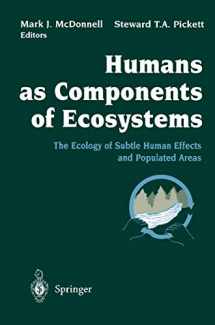
Humans as Components of Ecosystems: The Ecology of Subtle Human Effects and Populated Areas
ISBN-13:
9780387982434
ISBN-10:
0387982434
Edition:
1st ed. 1993. 2nd printing 1997
Author:
Steward T.A. Pickett, Mark J. McDonnell
Publication date:
1997
Publisher:
Springer
Format:
Paperback
385 pages
Category:
Biology
,
Biological Sciences
,
Geology
,
Earth Sciences
,
Conservation
,
Nature & Ecology
FREE US shipping
on ALL non-marketplace orders
Marketplace
from $45.48
USD
Marketplace offers
Seller
Condition
Note
Seller
Condition
Used - Very Good
Clean copy with unmarked text. Cover has mild wear to surface and corner tips. Small crease on back bottom cover corner. Binding is tight and square; no creases to spine.
Book details
ISBN-13:
9780387982434
ISBN-10:
0387982434
Edition:
1st ed. 1993. 2nd printing 1997
Author:
Steward T.A. Pickett, Mark J. McDonnell
Publication date:
1997
Publisher:
Springer
Format:
Paperback
385 pages
Category:
Biology
,
Biological Sciences
,
Geology
,
Earth Sciences
,
Conservation
,
Nature & Ecology
Summary
Humans as Components of Ecosystems: The Ecology of Subtle Human Effects and Populated Areas (ISBN-13: 9780387982434 and ISBN-10: 0387982434), written by authors
Steward T.A. Pickett, Mark J. McDonnell, was published by Springer in 1997.
With an overall rating of 3.8 stars, it's a notable title among other
Biology
(Biological Sciences, Geology, Earth Sciences, Conservation, Nature & Ecology) books. You can easily purchase or rent Humans as Components of Ecosystems: The Ecology of Subtle Human Effects and Populated Areas (Paperback) from BooksRun,
along with many other new and used
Biology
books
and textbooks.
And, if you're looking to sell your copy, our current buyback offer is $0.3.
Description
Highlighting the importance to ecological studies of incorporating humans and their effects on ecosystems, leading experts from a variety of disciplines address a number of important issues, including:* the prominent role of humans in the function of ecosystems on Earth* why humans have been ignored in ecological studies* approaches taken by social scientists, historians, geographers, economists, and anthropologists in the study of human activities* the emergence of a new ecological paradigm accommodating human activities* methods for studying subtle human effects, and human- populated ecosystems * future research and training required to include humans effectively as components of ecological systems. Of interest to students and researchers in ecology, and to policy-makers and environmental managers. In addition, it makes social scientists aware of new opportunties for integrating their ideas with those of ecologists.


We would LOVE it if you could help us and other readers by reviewing the book
Book review

Congratulations! We have received your book review.
{user}
{createdAt}
by {truncated_author}


